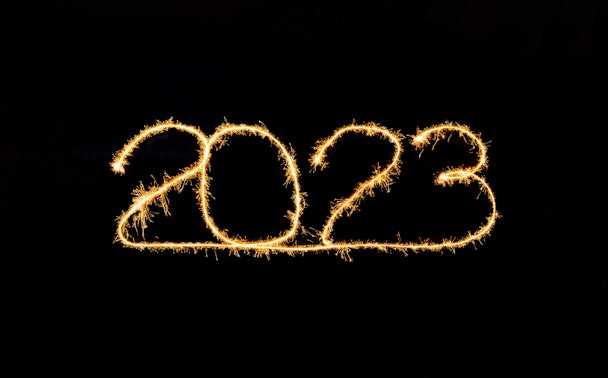2023: marketing’s year of the… what?
New year, new us. But new how? We asked a bumper crop of senior marketers what they reckon will be the big idea of the year ahead.

We ask marketers: What will dominate the industry’s year ahead? / Moritz Knöringer via Unsplash
Jamie Rosenbaum, senior strategy director, Jack Morton: the year of balance
As consumers, we over-did it in 2022. We went wild making up for the pandemic years. In 2023 we’ll quell our over-the-topness to find balance, and we’ll right-size our actions to be more purposeful and aligned with our evolving values and the changing world.
We’ll reject outdated norms, embrace accessible technology and stop acting like sustainability is new, ownable, or a choice. In the quest for balance, consumers will redefine what’s important to them and seek opportunities to unplug and immerse themselves in those aspects of life. This creates a tremendous opportunity for brands to reach consumers through experiences that are designed to be inclusive, accessible and crafted around passion points that connect communities, allowing consumers to escape everyday chaos and live in the moment.
Advertisement
Lauren McFarland, influencer marketing director, Journey Further: the year of ‘brandformance’
With looming budget cuts, increasing pressure to deliver growth, and a change in how consumers behave (and what they expect from advertising), performance and brand marketers are turning to each other for support.
Businesses can no longer succeed with siloed strategies. It’s time to take a ‘brandformance’ approach, where performance and brand teams have shared thinking, vision and KPIs, using influencer marketing to bridge the gap.
The creator economy has transformed the way that brands can reach audiences. Platforms like TikTok are constantly releasing new features that make it easier for marketing campaigns to deliver on business objectives, from awareness to acquisitions.
Google might not recognize ‘brandformance’ as a word just yet, but it won’t be long until the separation of these teams will be a distant memory.
Advertisement
Benjamin Pipat, chief solutions officer for technology solutions, Jellyfish: the year of automation
In 2023, the industry will continue moving toward total automation of bottom-funnel advertising. This change is driven by platforms; over the last few years, we’ve seen them creating specific products like Google’s Performance Max (PMax) and App Campaigns (GAC), Meta’s Advantage+, and Amazon’s Sponsored Display.
These products are gaining popularity as platforms make performance advertising more accessible to non-experts. Fully automated ads are bringing significant change to the industry, and the ways brands can target end customers. The move from choosing targeting (keywords or segments) to choosing an outcome (sales or clicks) is a step toward a black-box model.
Tasks like keyword mining or segment building may soon become obsolete, requiring staff reorganization and reskilling toward a focus on improving the inputs (creative assets) and the analysis of algorithmic performance.
Suggested newsletters for you
Jennifer Web, director of strategy, TrunkBBI: the year of Gen Z
As big online spenders, members of Gen Z are scrutinizing what businesses say and do more than any other generation. Understanding the complex set of drivers, attitudes and values of this digital-native generation is a challenge for many brands.
Gen Z is notably interested in creating meaningful change in their communities, society and the planet around them. They are the driving force behind trends that create profound change as they tackle fundamental issues including mental health, body positivity, 2000s nostalgia, distrust of government and organizations, diversity and social justice, consumer buying power, youth restlessness, peer power and gender fluidity.
This inspiring generation is forcing brands to radically rethink their marketing strategy. Many brands are now focusing on how to engage and build brand loyalty with a generation demanding a hyper-relevant and innovative mix of digital and social content and channels.
Becky Simms, founder and chief executive, Reflect Digital: the year of time to think
With the continual development of technology, automation and advancements in AI, 2023 gives us an opportunity to free up more time to think; to be strategic. The trick for marketers will be using this opportunity for enhanced efficiency.
Leveraging tools like ChatGPT to do some of the time-consuming work of researching and creating content can give the marketing team time to be more strategic about positioning, optimizing and distributing it to the right audiences.
This needs to be a deliberate consideration. It’s an excellent opportunity for enhanced productivity with the potential for greater results. Proceed with caution and don’t treat tech as a lazy shortcut, but as a new process freeing up time for marketers to add more value.
Tim Lardner, vice president of strategy, PMG: the year of acceleration
The advertising industry is in the middle of transformative change as consumer preferences shift and new entrants like TikTok, retail media networks and streaming TV platforms disrupt legacy advertising models. Advertising has grown increasingly complex and fragmented, posing new challenges alongside endless opportunities to accelerate brand growth and storytelling moments in new ways. 2023 will be characterized by brands that respond and activate against these trends with agility, discipline and innovation.
Stevie Johnson, managing director, Disrupt: the year of performance influencer marketing
In this economic climate, there will be a movement down the funnel across all marketing activity, which will affect the other trends we see.
Traditional brand awareness channels, such as influencer marketing, will have to keep up. Some argue that the influencer industry is moving toward becoming a performance channel, but the real acceleration is about to begin.
We’ll see an increase in performance-based campaigns and a closer synergy with affiliate marketing. Social media platforms continue to improve the user-shopping experience with increasingly up-to-date features, tying into bottom-of-the-funnel activity. For CMOs and procurement, tangible ROI is what will ensure they part with budget-wise for influencer campaigns.
Elise Stieferman, director of marketing and business strategy, Coegi: the year of content
Great marketing content will become more important than individual ads or campaigns. One could argue that it’s the year of data privacy as audience targeting rapidly diminishes amid tightening regulations. But the response to those limitations is not to find data workarounds or audience-targeting solutions. The key to success will be bringing content and paid media under the same strategic umbrella to keep your brand from drowning under the weight of the shifting privacy landscape.
Carli Pring, marketing manager, Tug: the year technology meets humanity
Smartphones. Social media. Virtual reality. Artificial intelligence. Augmented reality. Marketing is changing by the minute.
The evolution of technology continues to connect the world, which is more important than ever after a pandemic without human touch. We’re becoming less confined to traditional selling and advertising because of advancements in technology and data analytics in real time. As a result, technology is providing marketers with the tools to help brands adopt a human-centric approach to marketing.
Through the internet of things, marketers can understand demographics and psychographics, create marketing personas of target customer archetypes, market to customers’ emotions, and more. The desire for programmatic display will continue as marketers carry on looking at technological advancements to make (virtual or real) experiences as human as possible.
Bridget Hoepner, SEO lead, Incubeta: the year of new SEO
The content creation abilities of ChatGPT are enticing for marketers, but Google has stated that AI-generated content goes against its Webmaster Guidelines, so where does that leave us in the wake of the Helpful Content Update and content/experience-centric Core Updates?
Bottom line: Google and humans alike value content that is unique, relevant, high quality and helpful. There are many cases where ChatGPT meets the criteria. Conversely, humans have done a great job of publishing rubbish content on the internet, so the binary approach of ‘human content good’ and ‘AI content bad’ simply does not hold water.
Experiment with ChatGPT to create content at scale for things like product descriptions and FAQs. Don’t expect it to replace compelling sales copy or to nail your brand voice. Do expect expertise, authoritativeness and trustworthiness signals to increase in importance as Google differentiates between human- and AI-generated content.
Liz Baines, head of planning, The Agency Specsavers: the year of value
Over the last decade, advertising’s role has often been to create meaning in even the most mundane of products. By doing so, we’ve added complexity and ambiguity for customers.
As the cost-of-living crisis bites, many will be under pressure to constantly balance the books. In this context what’s helpful is not a brand’s virtue but its value. Advertising needs to give a brand’s potential customers complete confidence and clarity in the value that it offers.
At Specsavers, this isn’t new. The value that we offer customers has always been ‘expert care, affordable and accessible to all’. Whether it be our optometrists visiting the homes of those unable to come into our stores or continuing to offer market-leading prices, we’ll proudly continue to use our advertising to let customers know the value we offer them. Nothing more, nothing less.
Kristie Naha-Biswas, head of strategy, Assembly: the year of community
The community must be central to brands’ future growth plans. It is critical for brands to consider how to support communities through the financial crisis (we saw this with the shift in the tone of Christmas ads this year), and for media and marketing, it’s time to leave dated demographic (especially age-based) audience profiling and targeting behind.
Communities (large and small; geographical and shared-interest-based) should be the dominant way to understand groups of people. A deep understanding of brands’ relevant communities will inform channels, platforms and targeting. It will also enable a holistic communications plan, informing product, content and messaging for all touchpoints.
Content created with:

Specsavers
Find out more
Incubeta
Incubeta is a team of over 800 creators, thinkers, makers and doers working across 22 offices globally to unlock business growth for clients including Google, Hyundai,...
Find out more
Tug Agency
Tug is a performance driven, global digital marketing agency, optimised to grow ambitious brands, through the smart combination of data, media, content and technology.
Our...

Coegi
Coegi is an independent digital agency providing services across digital strategy, media buying, paid social, search and influencer campaigns. We bring together...
Find out more
Disrupt
Find out more
PMG
PMG is a global independent marketing services and technology company that seeks to inspire people and brands that anything is possible. Driven by shared success,...
Find out more
Reflect Digital Limited
Putting our client’s customers first, we work closely with ambitious global brands and eCommerce businesses looking to elevate their marketing and move towards...
Find out more
TrunkBBI
TrunkBBI is an award-winning integrated agency made up of 70 specialist thinkers, creators, analysts, influencers and technologists. Inspired by insights, we’re...
Find out more
Jellyfish
Jellyfish is a marketing performance company for the platform world, where success demands a creative, multi-platform mindset. We help brands thrive, by navigating,...
Find out more
Journey Further
Journey Further is a performance brand agency based in Leeds, Manchester, London and New York.
Designed to deliver Clarity at Speed for the world’s leading...

Jack Morton
No one sets out to be average. No one aspires to be ordinary. Jack Morton is an award-winning global brand experience agency that exists to reimagine what an experience...
Find out more
Assembly
Ad Age's Purpose-Led Agency of the Year. We're the modern alternative, bringing together data, talent, and tech to find the change that fuels growth.
Find out more
